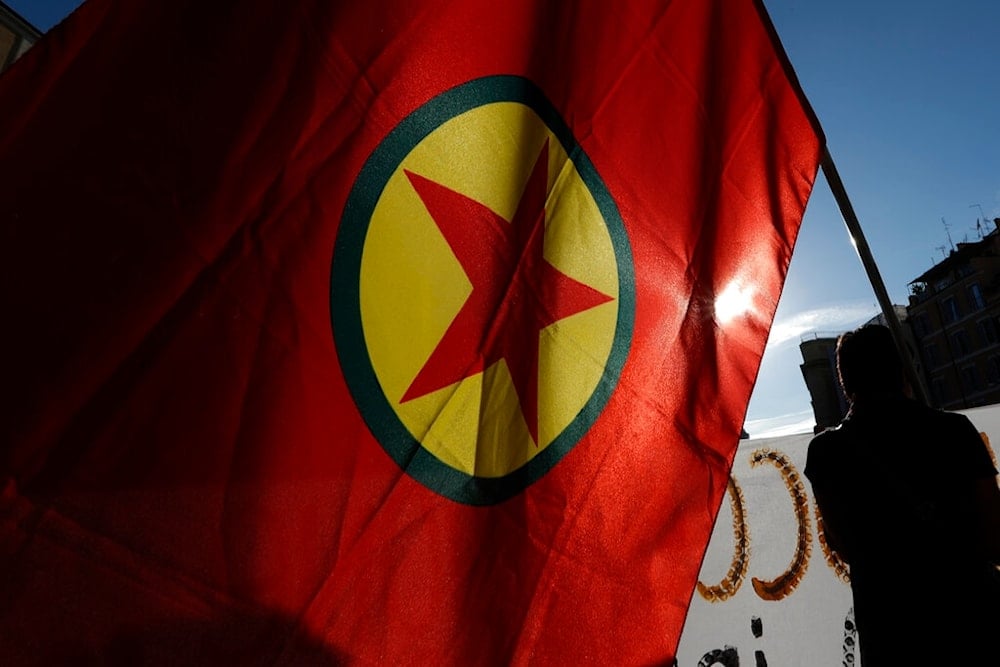Sources reveal to Al Mayadeen details of Ankara-PKK negotiations
According to the sources, the negotiations were prompted by the realization that the relationship between Ankara and the PKK had reached an impasse.
-

A pro-Kurdish activist waves a Kurdistan Workers Party, PKK, flag and shouts slogans as they protest against a Turkish military operation, on Wednesday, Oct. 9, 2019 (AP Photo/Andrew Medichini)
Turkiye has demanded that members of the Kurdistan Workers' Party (PKK) in the Turkish mountains lay down their arms, resolve their legal status with the state, or withdraw to the Qandil Mountains, sources told Al Mayadeen.
Ankara has also insisted on the withdrawal of PKK fighters from northern Syria, the sources added, reaffirming its rejection of any discussions about autonomy within Turkiye during negotiations with the Kurdish group.
According to the sources, Turkish intelligence is engaging in dialogue with the PKK’s leader, Abdullah Ocalan, in his prison cell.
The sources described the atmosphere of the negotiations between Ankara and the PKK as positive, noting "significant agreement on several issues with Ocalan."
All parties involved are cautious about leaking information, as "the negotiations require time and proceed through multiple stages," the sources stressed.
They also outlined these stages: initial talks with Ocalan, followed by presenting the discussions to the leadership in Qandil and then returning to Ocalan, in parallel with deliberations on developments.
The sources highlighted that all Turkish political parties, except for the nationalist Good Party and Victory Party, have agreed to consult with the Equality and Democracy Party, which supports Kurdish demands.
Kurdish demands
The informed sources outlined several Kurdish demands, including amending the law that permits the dismissal of elected mayors, lifting restrictions on union activities and strikes across Turkiye, halting the prosecution of the former Peoples’ Democratic Party (HDP), and dropping charges against its leaders and members. They also called for a general amnesty for political prisoners, particularly for Selahattin Demirtas.
The Kurds also demanded an end to arbitrary raids, stipulating that such actions require a court order rather than directives from the president or interior minister. Additionally, they proposed a constitutional settlement to entrench democracy and full citizenship that affirms everyone’s belonging to Turkiye.
During the negotiations, the Kurds were demanded to present guarantees to Ankara and the international community that no hostile military actions would be launched against Turkiye.
According to the sources, these negotiations were prompted by the realization that the relationship between Ankara and the PKK had reached an impasse, leaving both parties at a disadvantage without the possibility of resolution through force.
Other factors include Ankara’s understanding that international players, especially in Syria, will not abandon the Kurds, in addition to "Israel's" overt interest in coordinating with the Kurds and initial US approval for resolving the Kurdish issue.
Meetings between Damascus and SDF
Simultaneously with the Ankara-PKK negotiations, meetings were held between the Syrian government and the leadership of the Syrian Democratic Forces (SDF), according to Al Mayadeen's sources, who described the talks with the head of the new Syrian administration Ahmad al-Sharaa as "preliminary and exploratory," with plans for follow-up meetings.
The sources stated that al-Sharaa rejected federalism outright, emphasized the need to dissolve the Kurdish-led US-backed Syrian Democratic Forces (SDF), and insisted on the departure of PKK members from Syrian territory. He also stressed that oil facilities must be under Syrian state control.
Meanwhile, the SDF called for semi-autonomous governance, a revenue-sharing agreement on oil resources with Damascus, and that the army in the region consist of its own forces, while agreeing to the withdrawal of the PKK and all non-Syrian Kurdish fighters.
Additionally, the SDF demanded the establishment of a 20-kilometer-deep armed buffer zone along the Turkish border.
PKK elimination imminent: Turkish FM
On his part, Turkish Foreign Minister Hakan Fidan stated, "Conditions in Syria have changed. We believe it's only a matter of time before PKK/YPG is eliminated."
He also suggested that the new Syrian administration could assume responsibility for prisons housing ISIS detainees.
Turkey considers the People's Protection Units (YPG), the primary force within the SDF, to be a terrorist organization connected to its banned domestic adversary, the Kurdistan Workers' Party (PKK).
Fidan cautioned against any Western backing for Kurdish fighters in Syria.
"If you (the West) have different aims in the region, if you want to serve another policy by using Daesh as an excuse to embolden the PKK, then there is no way for that either," he said, using an Arabic acronym for IS group.
However, the United States has long regarded the SDF—who fought against ISIS in 2019 and oversees prisons and camps housing extremist detainees—as essential to preventing the terrorist group's resurgence.

 5 Min Read
5 Min Read










